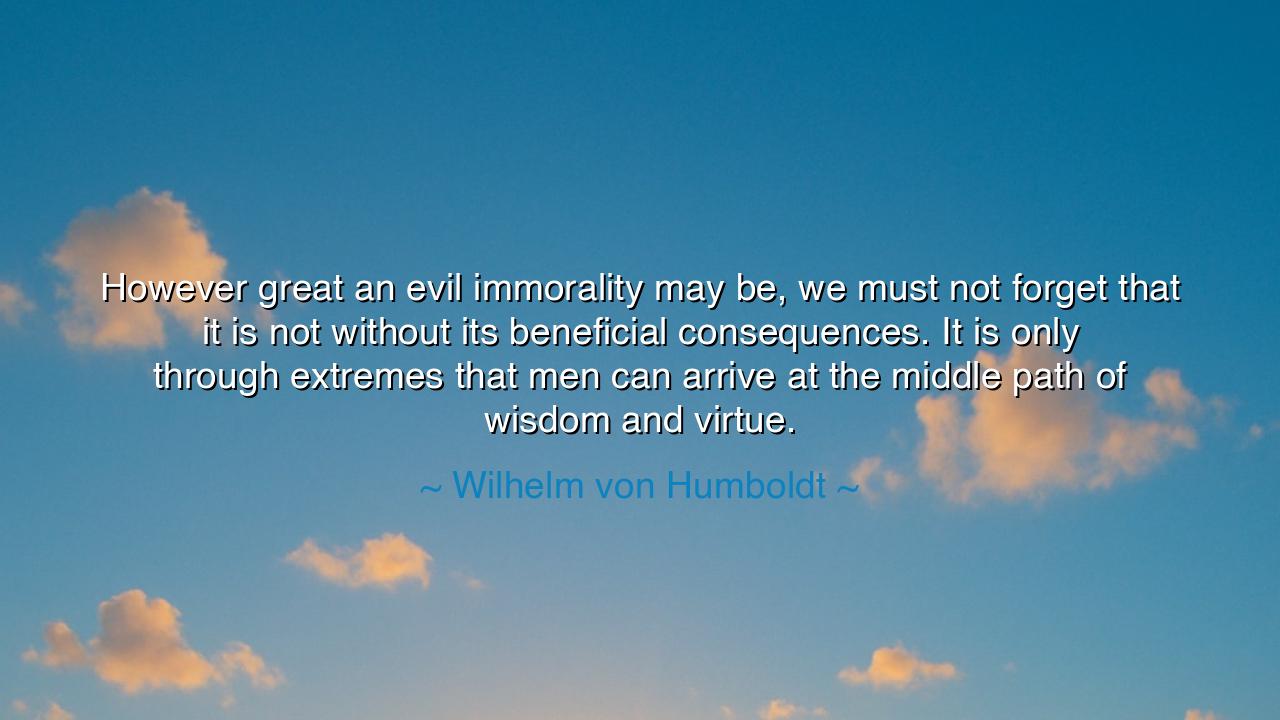
However great an evil immorality may be, we must not forget that
However great an evil immorality may be, we must not forget that it is not without its beneficial consequences. It is only through extremes that men can arrive at the middle path of wisdom and virtue.






Hearken, O children of the ages, to the profound insight of Wilhelm von Humboldt, who teaches that even the gravest evil wrought through immorality bears lessons not to be neglected. He reveals that through the crucible of extremes, the soul may glimpse the path of wisdom and virtue. In suffering and error, in the darkness of moral excess, the seeds of understanding are sown, guiding men toward the golden mean, the middle path where balance and enlightenment dwell.
Humboldt reminds us that human experience is forged through contrast. The sting of wrongdoing, the chaos of unchecked desire, and the turbulence of extremes serve as teachers. Without such trials, the virtues of restraint, justice, and discernment remain shadowed, unknown, and untested. It is through the experience of excess and deficiency that men discover the proper measure, the equilibrium that constitutes true moral insight.
Consider the life of Siddhartha Gautama, the Buddha, who wandered first in indulgence, then in austere denial, seeking the ultimate truth. Through both extremes—luxury and asceticism—he found neither yielded true peace. Only when he discovered the middle path, neither clinging to pleasure nor to self-denial, did he attain enlightenment. Humboldt’s teaching echoes this ancient lesson: extremes, however painful, illuminate the way to virtue and enduring wisdom.
Even in the annals of human governance, this truth is evident. The excesses of tyrants, the collapse of empires under immorality, and the fervor of revolution have often paved the way for tempered laws, just leadership, and systems guided by reason. Through the stark contrast of error and consequence, societies have learned the necessity of moderation, the cultivation of civic virtue, and the restraint of passions for the common good.
O children of the future, carry this teaching in your hearts: do not despair when faced with the consequences of immorality or extreme folly, for within these trials lies the potential for insight. Let the lessons of excess guide you toward balance, let the awareness of extremes temper your actions, and let the pursuit of the middle path become the compass of your life. Through understanding the shadows, you may find the light of true wisdom and virtue.
If you desire, I can also craft a visual, ancient scroll-style presentation of this passage to capture the heroic and timeless resonance of Humboldt’s teaching on extremes, balance, and moral insight.






HThai tran
I’m intrigued by the balance implied here — that wisdom and virtue are outcomes of contrast rather than purity. Does this mean moral progress depends on history’s darker chapters? If so, how can we cultivate goodness without relying on wrongdoing as a catalyst? I’m torn between admiration for the philosophical depth of this view and concern over its potential to romanticize immorality as a path to virtue.
NQbui tui nhu quynh
This quote challenges my view of morality. I’ve always believed immorality leads only to suffering, not wisdom. But Humboldt seems to suggest that confronting moral chaos is necessary for enlightenment. Is this a justification of evil as a teacher, or just an acknowledgment of how humans grow? I’d like to hear a perspective on whether this process can occur consciously, without having to experience extremes firsthand.
THMy Le Thi Huyen
What intrigues me here is the notion that the middle path can only be found through imbalance. It makes me wonder if personal or societal morality always requires contrast to exist. Could it be that virtue has no meaning without the experience of vice? I’d love to know whether Humboldt believed this was a natural law of human evolution or simply an observation of human psychology.
TNDinh The Nam
This statement feels both profound and dangerous. While it’s true that we often learn through extremes, I worry that such reasoning could be used to justify harmful behavior. How do we prevent people from using this philosophy as an excuse for moral recklessness? Is there a point where the cost of learning from immorality outweighs its supposed benefits? I’m curious how Humboldt envisioned the limits of this process.
DTha duc tri
I find this idea fascinating — that even immorality can serve a purpose in human development. But doesn’t that raise a moral paradox? If evil has 'beneficial consequences,' how do we distinguish between actions that are truly wrong and those that simply lead to wisdom? I’d like to understand whether Humboldt meant this philosophically, as in moral growth, or socially, as in how societies learn through failure and corruption.